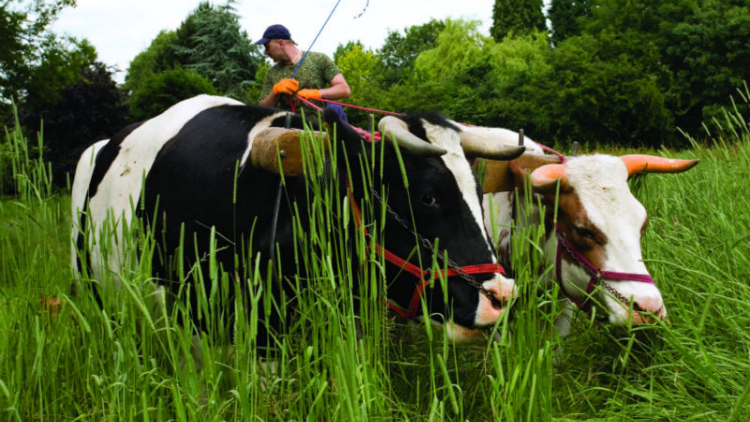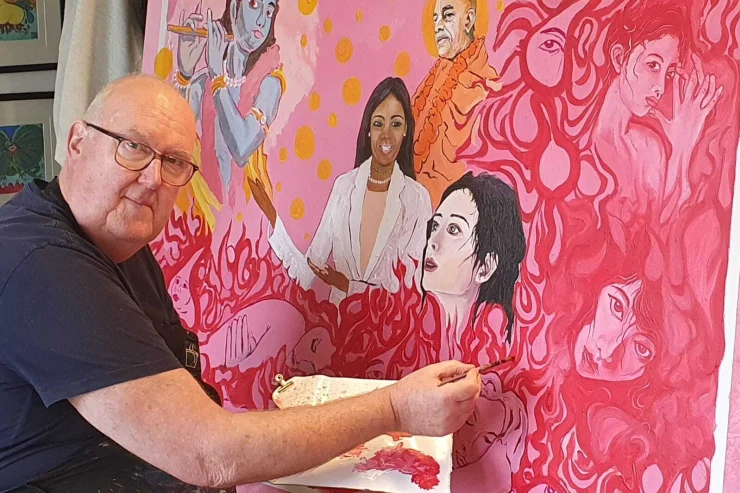We Must Accept High Cost of Cow Protection, Says New Minister
By Madhava Smullen | Май 15, 2014

We can have successful cow protection projects in ISKCON. But only if we’re willing to accept the high cost of violence-free milk, and of caring for cows and their handlers.
That’s the message that Shyamasundara Das, the recently appointed Global Minister for Cow Protection and Agriculture, is bringing to communities around the world.
In an age of convenience and cheap dairy products, he says, it all comes down to one thing: how important is cow protection to us?
Shyamasundara Das received his new title at the Annual General Meetings of ISKCON’s Governing Body Commission in Mayapur, West Bengal earlier this spring. He took on the service after former Global Minister Balabhadra Das resigned due to health issues.
Prior to that, Shyamasundara had overseen the Goshala (cow shelter) at Bhaktivedanta Manor near London in the UK since 1992, a position which he still holds. Under his leadership, the Manor’s herd has grown to fifty-seven cows and bulls, and is producing 40,000 liters of milk and logging about 3,000 ox hours a year.

Devotees take a tour at the Bhaktivedanta Manor Farm Conference
For the past six years, Shyamasundara has also served as European Minister for Cow Protection and Agriculture, and has toured ISKCON’s European farm communities, reminding them of the importance of cow protection and agriculture. His efforts have been set against a global decrease in energy and investment in such projects around ISKCON.
Through his tours, though, many European farms that were giving up cow protection have reactivated their projects and are now milking cows and working oxen. These include Radhadesh, Belgium; Simhachalam, Germany; Villa Vrindavana, Italy; Govindadvipa, Ireland; and New Mayapur, France.
Now, expanding his role as Minister for Cow Protection and Agriculture to a global one, Shyamasundara will spend his first year surveying and understanding ISKCON cow protection projects around the world.
He will then will take one month off a year from his service at the Bhaktivedanta Manor Goshala to travel around the world with his message.
He will naturally continue to vist Europe, holding the seventh annual ISKCON European Farm Conference in Simhachalam, Germany from September 16th to 18th, and looking to inspire the 30 or so leaders from all over Europe expected to attend.
But he also plans to visit a different continent every year, to encourage struggling communities to reactivate their cow protection and agricultural projects, as well as to work with ISKCON’s larger cow protection projects and assist them in coming to exemplary standards.

Devotees milk cows at New Gokula
In Europe, Bhaktivedanta Manor’s New Gokula farm, and New Vraja Dhama in Hungary, which have similar-sized herds, are already extremely successful.
In the US, Shyamasundara also sees Gita Nagari in Pennsylvania and New Vrindaban in West Virginia as premier projects he wants to work with.
With 28 milking cows, 19 retired cows and oxen and 14 calves, Gita Nagari produces around 600 gallons of milk a week, has its own creamery and sells much of its yield to neighboring city temples. New Vrindaban, meanwhile, has 47 cows and oxen including six milking cows, and is attempting to use only protected cow milk in meals served at its temple.
Then, of course, there’s India. Shyamasundara plans to spend some time every year visiting the country, as ISKCON Founder Srila Prabhupada hoped goshalas there would set an example for others around the world.
While a lot of work is yet to be done to achieve this goal, Shyamasundara hopes that the goshalas in two of the most sacred places in India – Mayapur in West Bengal and Vrindavana in Uttar Pradesh – will develop to the point where they do set examples that ISKCON communities everywhere will follow. Mayapur in particular, with its plans to build a city for 50,000 people, will be a major focus.

Shyamasundara Das (center, writing) at the first annual ISKCON farm conference in 2008 in Krishna-valley, Hungary.
To all these projects, Shyamasundara is delivering his own “inconvenient truth”: if we want cow protection, we must accept the cost.
“Homegrown, Hare Krishna milk is six times the conventional price,” he says, explaining that this cost includes building and maintenance of a goshala, personal care to the cows, milking cows by hand rather than machine, and supporting people to care for the cows.
“Volunteers play a significant role in our cow protection projects, but the heart of them are people we maintain,” Shyamasundara says. “If you want stable cow protection, you have to have stable people. And stable people come if you meet their five needs: they need housing, work that’s satisfying for them, some social life, they need to be able to fulfill their children’s needs, and they need to be able to accumulate assets of some sort.”
Accepting all these costs will guarantee a successful cow protection program, Shyamasundara explains. And that’s important, even if it means reducing (but not stopping) milk use to be able to afford it. As Srila Prabhupada advised, “take as much milk as possible.”
Shyamasundara compares it to when gasoline prices skyrocket. People don’t stop driving, but they accept the situation, and adapt to it by cutting back on their gas consumption.
“It’s going to take a gradual negotiation and weaning process to get people to accept these higher economics,” he says. “It’s a slow process. But I think gradually, the message is being accepted.”

Devotees discuss veganism versus ahimsa milk at ISKCON’s European Leaders Meetings in 2013
Just as important as accepting the price of protected cow milk is ISKCON’s responsibility to work oxen, according to Shyamasundara, even if it’s a major inconvenience for those of us used to the ease of the modern world.
“If we don’t make arrangements for oxen to work, we’ll be inadvertently making arrangements for tractors and other transport means to replace them,” he says. “So it’s going to require very bold, brave leadership.”
To keep local leaders focused and inspired to do something about cow protection, Shyamasundara plans to continue former Global Minister Balabhadra Dasa’s work in establishing regional representatives for cow protection and agriculture around the world, who will visit and encourage communities in their continents more regularly than he is able to.
Shyamasundara’s long term plan is to have all local leaders in ISKCON ask their communities for a plan on what to do about cow protection and agriculture, and how to do it. He would also like to see all major temples – especially in India – use their resources to work out an economic plan to ensure that every drop of milk they use comes from their own cows.
“I find it daunting, but very exciting to be part of the incredible dilemmas that Srila Prabhupada left us,” says Shyamasundara. “We have a mammoth task to establish cow protection and agriculture in a vastly declining society. Prabhupada was such a brave man and said such far reaching things. And it’s a challenge. But I like working with bulls, and I like cows. It suits my nature. So I’m happy to play this role, and I’m excited to be part of this element of his mission.”















